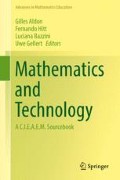Abstract
In this Commentary I reflect on the work done by the authors of five chapters in relation to technology-related professional development for mathematics teachers across a range of educational levels, undertaken in a variety of contextual settings, and drawing on a wealth of theoretical frameworks to support a diversity of practical approaches to implementation involving teachers, current and prospective, their students, and researchers in ongoing knowledge building and theory development. My reflections will be refracted through the three other major themes of this book which intersect in professional development: (a) technology as a tool for teaching and learning mathematics, (b) communication inside and outside the classroom, and (c) information tools, to inform oneself and to inform others.
Access this chapter
Tax calculation will be finalised at checkout
Purchases are for personal use only
References
Ball, D. L., Thames, M. H., & Phelps, G. (2008). Content knowledge for teaching, what makes it special? Journal of Teacher Education, 59(5), 389–407.
Ball, L., Steinle, V., & Chang, S. (2015). A proof-of-concept virtual learning environment for professional learning of teachers of mathematics: Students’ thinking about decimals. In K. Beswick, T. Muir, & J. Wells (Eds.), Proceedings of PME 39 (Vol. 2, pp. 65–72). Hobart: PME.
Bellamy, R. K. E. (1996). Designing educational technology: Computer-mediated change. In B. A. Nardi (Ed.), Context and consciousness: Activity theory and human-computer interaction (pp. 123–146). Cambridge, MA: MIT Press.
Borba, M. C., & Villarreal, M. E. (with D’Ambrosio, U., & Skovsmose, O.). (2005). Humans-with-media and the reorganization of mathematical thinking: Information and communication technologies, modeling, visualization and experimentation. New York: Springer.
Drijvers, P. (2012). Digital technology in mathematics education: Why it works (or doesn’t). In Proceedings of ICME 12. Seoul, Korea, 9–12 July 2012.
FitzSimons, G. E. (1998). Statistics for vocational, technical, and 2-year college students. In L. Pereira-Mendoza, L. S. Kea, T. W. Kee, & W.-K. Wong (Eds.), Statistical education: Expanding the network. Proceedings of ICOTS 5 (Vol. Vol. 1, pp. 145–150). Voorburg: International Association for Statistical Education.
FitzSimons, G. E. (2001). Integrating mathematics, statistics, and technology in vocational and workplace education. International Journal of Mathematics, Science, and Technology Education, 32(3), 375–383.
FitzSimons, G. E. (2014). Mathematics in and for work in a globalised environment. Quaderni di Ricerca in Didattica/Mathematics, 24(1), 18–36.
FitzSimons, G. E. (2015). Learning mathematics in and out of school: A workplace education perspective. In U. Gellert, J. Giménez Rodríguez, C. Hahn, & S. Kafoussi (Eds.), Educational paths to mathematics. A C.I.E.A.E.M. sourcebook (pp. 99–115). Cham: Springer.
Fried, M. N., & Dreyfus, T. (Eds.). (2014). Mathematics & mathematics education: Searching for common ground. Dordrecht: Springer.
Kent, P., Bakker, A., Hoyles, C., & Noss, R. (2011). Measurement in the workplace: The case of process improvement in the manufacturing industry. ZDM – The International Journal on Mathematics Education, 43(5), 747–758.
Koehler, M. J., & Mishra, P. (2008). Introducing technological pedagogical knowledge. In The Handbook of technological pedagogical content knowledge for educators. New York: AACTE/Routledge.
Koehler, M. J., & Mishra, P. (2009). What is technological pedagogical content knowledge? Contemporary Issues in Technology and Teacher Education, 9(1), 60–70.
Mishra, P., & Koehler, M. (2006). Technological pedagogical content knowledge: A framework for teacher knowledge. Teachers College Record, 108(6), 1017–1054.
Rabardel, P. (1995). Les hommes et les technologies une approche cognitive des instruments contemporains. Paris: Armand Colin.
Ruthven, K. (2011). Conceptualising mathematical knowledge in teaching. In T. Rowland & K. Ruthven (Eds.), Mathematical knowledge in teaching (pp. 83–96). New York: Springer.
Tapan, M. S. (2006). Différents types de savoirs mis en oeuvre dans la formation initiale d’enseigants de mathématiques à l’intégration de technolgoies de géométrie dynamique. Grenoble 1: Université Joseph Fourier.
Thomas, & Palmer. (2014). Teaching with digital technology: Obstacles and opportunities. In A. Clark-Wilson, O. Robutti, & N. Sinclair (Eds.), The mathematics teacher in the digital era (pp. 71–89). New York: Springer.
Trouche, L. (2007). Environnements informatisés d’apprentissage: quelle assistance didactique pour la construction des instruments mathématiques? In R. Floris & F. Conne (Eds.), Environnements informatisés, enjeux pour l’enseignement des mathématiques (pp. 19–38). Brussels: De Boeck & Larcier.
Acknowledgments
I wish to acknowledgement the work of Lisa Björklund Boistrup for her insightful comments on an earlier draft of this commentary.
Author information
Authors and Affiliations
Corresponding author
Editor information
Editors and Affiliations
Rights and permissions
Copyright information
© 2017 Springer International Publishing AG
About this chapter
Cite this chapter
FitzSimons, G.E. (2017). Technology and Teachers’ Professional Development: A Commentary. In: Aldon, G., Hitt, F., Bazzini, L., Gellert, U. (eds) Mathematics and Technology. Advances in Mathematics Education. Springer, Cham. https://doi.org/10.1007/978-3-319-51380-5_27
Download citation
DOI: https://doi.org/10.1007/978-3-319-51380-5_27
Published:
Publisher Name: Springer, Cham
Print ISBN: 978-3-319-51378-2
Online ISBN: 978-3-319-51380-5
eBook Packages: EducationEducation (R0)

